SeedBlink Blog
technology Trends
Revolutionizing Healthcare in Europe with Artificial Intelligence
AI: Opportunity or threat? Explore how VCs and startups bet on AI’s potential in the HealthTech industry.
Artificial intelligence (AI) has momentum worldwide, with a market size of $327.5 billion. Global ecosystems are predicting AI to reach a +30% growth rate by 2027, with the US market expecting to reach $190.61 billion by 2025 and other countries rising as new technology leaders in this industry.
China, for example, is focused on becoming a world leader in AI and has a national strategic priority for the upcoming years. Once hit by a global pandemic, the healthcare sector faced a massive challenge in adopting new technologies to diagnose and cure people faster. Detecting a new and different virus from anything known until that point required faster digitizing systems and processing the integration of new technologies.
The global market for artificial intelligence in healthcare was valued at 10.4 billion USD in 2021 and is expected to grow at an annual growth rate of +30% by 2030. This is why, today, we wanted to look deeper at how these technologies shape the industry that helps us stay healthy.
What is AI in Healthcare?
Healthcare organizations use artificial intelligence technologies to capture and process patient data faster, diagnose better, identify patterns and cure new diseases, and automate heavy processes that require different manual inputs. The main advantage of a faster digitalization process is the healthcare ecosystem moving from a reactive ecosystem to an industry that prevents diseases.
Artificial intelligence and machine learning (ML) are changing our interaction with hospitals and healthcare institutions. As we saw during the pandemic, AI helped doctors and research organizations learn the patterns of COVID-19 and identify treatment and vaccines faster than other diseases in the past.
Risk or Opportunity
As artificial intelligence changes the face of the services we know and our direct interaction with the healthcare ecosystem, potential risks and problems appear. So, let’s take a quick tour around the industry to see what advantages and disadvantages we find and what impact it could have on our everyday lives.
How Artificial Intelligence is Changing the Domain
The healthcare system is more than our simple patient-doctor interaction; we will discover some core areas below. From helping a medical organization run faster to assisting doctors in focusing on the patient and their diseases, artificial intelligence plays different roles in shaping how we interact with it.
The COVID-19 pandemic has significantly impacted the healthcare industry, accelerating the adoption of healthtech and attracting venture capital (VC) investments. The pandemic highlighted the importance of remote healthcare services, such as telemedicine and remote patient monitoring. Healthtech companies have been developing innovative solutions to address these needs, which has caught the attention of VCs.
Healthcare has traditionally needed to be faster to adopt digital technologies than other industries. COVID-19 pushed healthcare providers to adopt new tools and platforms, making healthtech a more attractive investment.
Additionally, governments and regulatory bodies have recognized the need for digital health solutions and have implemented measures to support their development and adoption. This support has created a more favorable environment for healthtech startups.
Automated internal processes and smaller operating costs
30% of healthcare costs are associated with administrative tasks, and bringing artificial intelligence to automating tasks and processes creates new opportunities.
Improving the diagnostic process
Establishing the right diagnosis was one of the main challenges doctors faced due to the lack of a suitable place to follow someone’s medical history. Driven by paper-based processes and diagnostics, it was easy to set the wrong treatment that could impact other existing diseases a patient might have.
New digital technologies and artificial intelligence have created a digital overview where doctors can create patient profiles and store medical history records. This way, they could diagnose faster, make better data-based decisions, predict possible outcomes after treatment, and leave less space for human errors.
Better medical services and patient care
Remember when you needed to visit the doctor and spent all day waiting for your appointment? On top of this, you went from one office to another, carried the information from one doctor to another, and had different tests. Still, you have yet to hear anything during the process. The huge miscommunication in the healthcare ecosystem usually leads to patients getting frustrated, doctors being overwhelmed, and everyone having a negative experience. The system still relies on people and paper, which are finite resources.
Artificial intelligence can change things, allowing healthcare organizations to offer better services. This technology can keep every doctor connected to your medical history in one place, provide quick access to the latest data, run automated reports, spot possible patterns, and create a clear path to follow for your treatment. The digital version, empowered by AI, ML, and other new technologies, can run anytime you need it, even when nobody is in the office.
Faster communication and data exchange
As we just saw, sometimes patients or doctors are the ones who carry the information from one place to another. It takes time and resources and makes everyone’s experience a complicated one.
Another advantage of AI usage in healthcare is that it allows people and organizations to communicate faster. You can save and share data more efficiently, enabling doctors to focus on the patient and their treatment rather than on the operational tasks needed to perform it. The advantage of AI and the usage of new wearable devices increases the potential of these technologies and how we receive treatments.
A focus on prevention, not a reaction
Most of us go to the doctor when something isn’t right. Doctors investigate possible problems and offer us the proper treatment for them. However, they could predict some of these health issues by correlating our medical history with new viruses or behavior patterns.
Artificial intelligence can run tests and analyze massive amounts of data compared to humans. Whenever an algorithm finds a problem known to raise a signal that something is incorrect, doctors can act early before a disease advances. On top of data analysis, medical devices can monitor your health parameters over time and show potential associated issues.
What Are The Potential Issues of AI Changing Healthcare?
Keeping personal health information and data security are two of the most important factors people consider when engaging with a healthcare organization.
The HIPAA Privacy Rule, a national standard protecting individuals’ medical records and other health information, regulates the US healthcare industry.

Another common challenge in implementing artificial intelligence in healthcare is the technology's ongoing development. AI has proved to have a profound effect across multiple industries, but integrating it into legacy systems is becoming more complicated.
Getting the right technology in the right place
Different solutions are available for various problems; finding the right one is sometimes challenging for the people involved. As we discussed earlier, artificial intelligence still has a long road ahead until we reach a refined version and we, as humans, manage to understand each corner of it completely. The technology behind it is under continuous development, and its brain tends to learn faster than we do, so it might become difficult for us to process its complex systems.
In healthcare, medical organizations investing in AI and integrating technology into their processes and services must invest time and resources alongside trustworthy partners. Compared to other areas and industries, the wrong implementation of AI in the medical field can affect patient treatments and a person’s life.
Still assisting AI with human power
It is going back to the same roots. Artificial intelligence still needs to be more powerful to take over everything independently. Another reason the industry needs assistance from a human being with the knowledge and experience to understand its power and effect.
For example, in the diagnosis area, artificial intelligence remains a doctor’s second pair of eyes, where technology is used as a support system.
An unclear regulation for ongoing developments
We see a major hope for AI's potential in healthcare following successful implementations. However, there are areas of applicability where regulations need a new version, covering new elements as technology advances.
Despite having HIPAA regulations in the United States, the use of patient data and its adjacent processes make it difficult for companies developing AI solutions and healthcare organizations to embrace it fully.
Overview of AI in Healthcare in Europe
The funding of AI developments in healthcare has momentum, and investors are fearless in pouring in more money, seeing great potential in this industry.
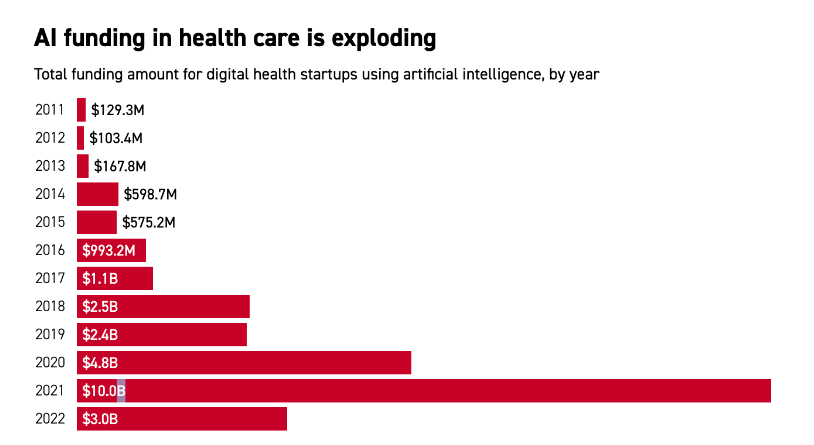
Despite the uncertain times we have had since the pandemic started, European venture investments in healthcare are not showing any negative impact. According to Silicon Valley Bank, the volume of transactions doubled, rising from $8.4 billion in 2020 to $13.9 billion last year.
At the same time, the number of rounds, going from Series B to above, has grown from 20+ in 2020 to +30 in the past year. The number of health tech companies that use artificial intelligence in their product offerings in Europe has also increased from $3.7 billion in 2022, growing 2x compared to the previous year.
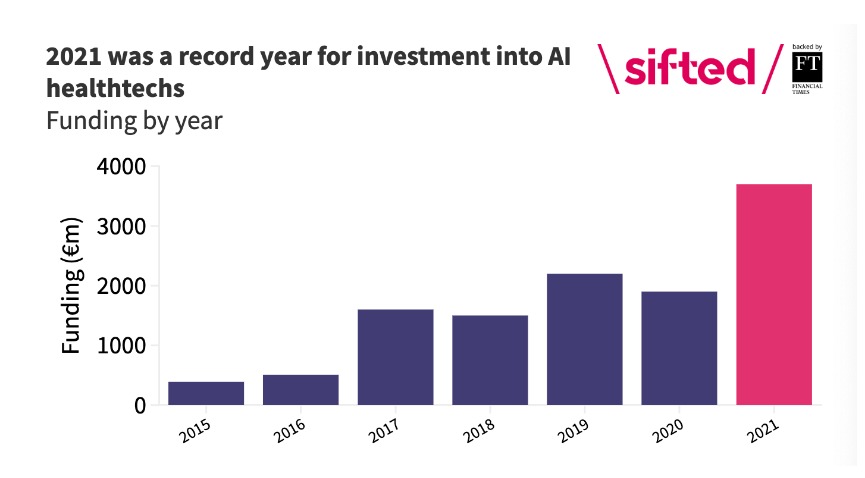
In 2022, the Healthtech and Biotech sectors were the second most funded startup industries, according to Dealroom. After raising $55 billion in 2022, the healthtech industry maintained higher funding than pre-pandemic levels. Moreover, if we take a closer look at the sub-sectors that catch the eyes of investors and attract the most significant amounts of funding, we find AI to be the number one interest.
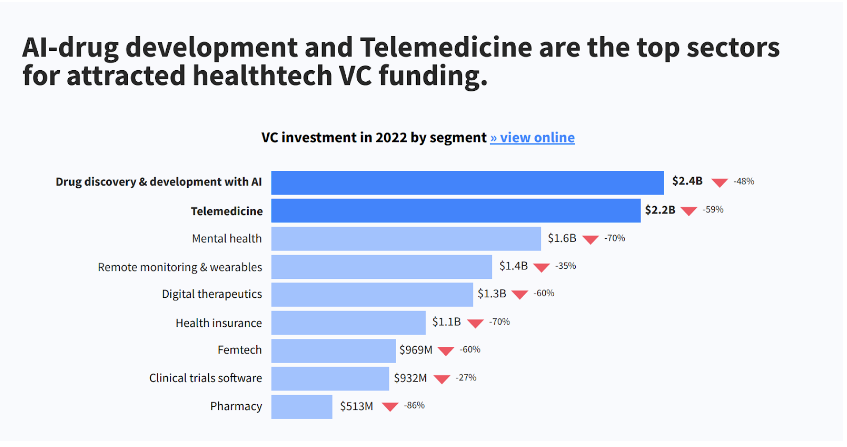
European Investors Betting on The AI-powered Healthcare System
As we previously saw, European investors strongly believe in the potential hidden within this industry and are strongly backing new initiatives with more capital. Some of the most prominent investors supporting the innovation of health tech startups in the ecosystem are:
- Earlybird VC — Earlybird VC is a Berlin-based multistage investor focusing on European tech companies. They have a dedicated fund for healthcare that focuses on early and later-stage opportunities in digital health, medical devices, diagnostics, enabling technologies, and biopharma across Europe.
- Almi Invest — Almi Invest is Sweden’s most active startup investor, and one of its main focus areas is investing in health tech companies, drug development, and eHealth. Their portfolio is counting down 100+ investments in the healthcare sector and continues to find new opportunities.
- Hiventures — The Hungarian-based venture capital firm changed its focus towards the opportunities in health tech companies since COVID-19 started. Hiventures’ portfolio counts 20+ investments in the medtech area.
4 European Startups Using AI to Disrupt The Healthcare Industry
Idoven
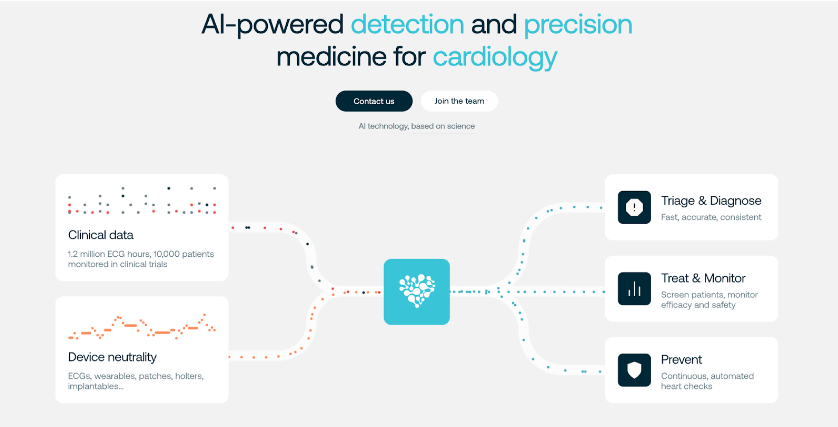
Idoven is a Madrid-based startup seeking to change how heart diseases are cured. They use artificial intelligence to detect the initial signs of heart disease and machine learning that takes data from hospital hardware devices wired to body sensors.
The algorithm developed by Idoven analyzes any potential pattern in the ECG data collected from patients and has managed to gather input from +40K patients. At the beginning of this year, Idoven raised a $12.9m Series A round co-led by New York-based Insight Partners and London-based Northzone, with participation from Wayra (Telefónica’s corporate venture arm), supplemented by $6.9m in grant and equity funding from the European Innovation Council Accelerator.
BenevolentAI - AI-enabled Drug Discovery
BenevolentAi combines advanced artificial intelligence technology and machine learning with cutting-edge science to decipher complex biology and discover the right therapeutic intervention.
The company has raised $292M in total funding from six investors and went public this year via SPAC on the Amsterdam Euronext exchange at a valuation of $1.6 billion.
Ada Health
Ada Health is a digital health company founded by doctors, scientists, and industry pioneers to help improve clients’ health.
Ada uses an AI platform to diagnose symptoms and offer treatment advice to users. Their core system integrates medical knowledge and artificial intelligence to empower people to actively manage their health and medical professionals to deliver effective care.
Aidence
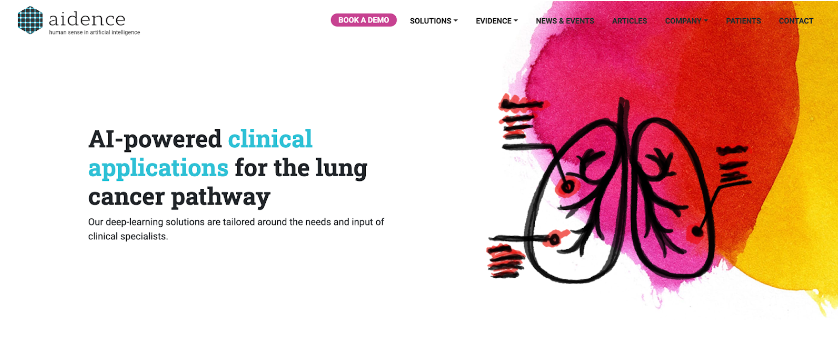
Aidence is a Dutch startup that is improving healthcare using Computer-Aided Diagnostics. The company develops AI-based clinical applications for the oncology pathway. Their first solution is Veye Lung Nodules, an AI-based solution for pulmonary nodule management on chest CTs.
Aidence’s software uses Deep Learning, a cutting-edge AI form that trains computers to read medical images and automatically provide structured reports.
How Seedblink’s Health Tech Startups Are Using AI
Frontwave
Breast cancer is a global health concern, affecting over 2 million women annually and claiming the lives of 600,000. However, early detection can significantly increase survival rates, with up to 95% of cases surviving when detected early. Hence, accurate and timely diagnosis is pivotal in our fight against this disease.
Currently, available image post-processing software and artificial intelligence tools rely on the original image quality from these devices without improving the initial image quality. The results are limited by the quantity and quality of information the original image provides.
Frontwave uses artificial intelligence in their product to identify tumors more reliably and accurately than current techniques. The solution is a scalable Software as a Service (SaaS) solution, accommodating a range of business models, including pay-per-image, subscription, and licensing.
The company is raising an early seed round on SeedBlink of €700,000, with €500.000 pre-committed money and Farside Ventures & Capital Cell as lead investors.
Tendertec
The world is facing a critical social care gap, with over two-thirds of elders choosing to age at home yet facing a shortage of care workers exceeding one million in Europe by 2023. Coupled with rising care costs, it has made home care increasingly unaffordable.
In Europe, the care worker shortage has already exceeded one million. At the same time, the aging population is growing. The demand for LTC services is driven by the 140 million people aged 80 and above, a number expected to triple by 2050. Currently, 80% of care is provided by unpaid/family caregivers. Two-thirds are at risk of health issues or quitting work.
Tendertec aims to make home caregiving easier and less stressful by using an alert-based technology through the Hestia platform that offers 24/7 monitoring and signals possible incidents.
Hestia is the AI co-pilot for ageing journeys - a care decision support platform using machine learning and heat sensing to capture missed hazards and hidden risks and keep elders connected. Hestia augments the ability of caregivers to support more people simultaneously and prevent hidden dangers from developing into very big problems that have a detrimental impact on elders, their carers, families, and our healthcare systems.
The company is raising an early seed round on SeedBlink of €400,000 to revolutionize at-home care and improve aging experiences for the elderly.
MEDIjobs
The current healthcare recruitment market is outdated and broken. You have job ads with no applicants, Expensive recruiting agencies that rely on the headhunter’s gut feeling, Inconsistent employee referrals, or social media, and proving none of them works.
The company’s vision is to create an efficient solution for the segment of more than 900,000+ healthcare SMBs that now have no better option than to post a job on Indeed or ask for employee referrals.
Medijobs is a virtual recruiting platform for the healthcare sector that uses artificial intelligence to connect employers with highly compatible candidates within seven days and hire within 15 days. The platform uses 500+ data points not only to match candidates to jobs but also personalities to an organization's culture - the thing that impacts long-term employee retention.
The company is raising an early seed round on SeedBlink of €650,000, with €450.000 pre-committed money and Morgan Stanley and Mubadala Capital as lead investors.
Oncochain
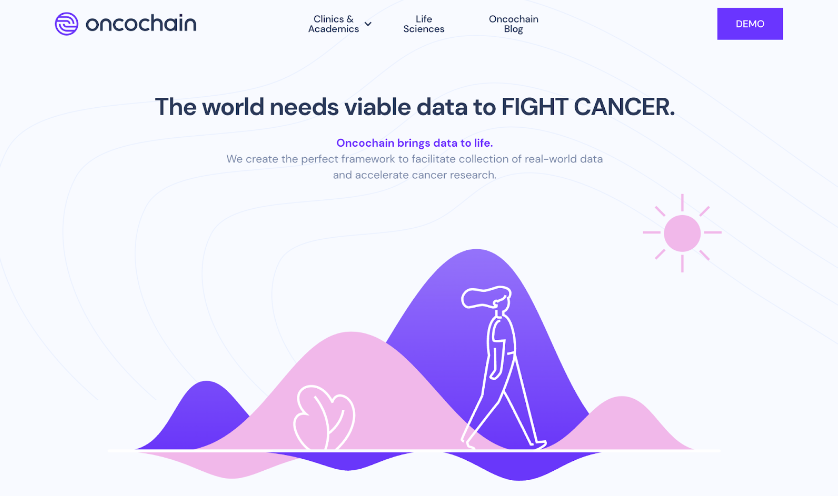
Oncochain is a software company that solves specific problems regarding medical data in Oncology. Its main objective is to empower oncology health professionals, cancer institutions, and pharmaceutical companies with structured clinical data captured in daily routine practice.
Oncochain uses AI as a powerful technology applied to oncology to provide valuable insights for doctors and cancer patients. They ensure an optimal and qualitative process of curating data with the help of NLP (Natural Language Processing). This assures a more effective retrieval of information from diverse sources to rapidly structure massive data and train new models for specific tasks.
Oncochain uses its machine learning model to ensure data quality standards and quickly spot errors in data that human beings can’t easily detect. They use RPA (Robotic Process Automation) to access multiple sources of information to extract, merge, and reconcile data from medical records. It enables them to quickly process massive amounts of data and automate manual, repetitive tasks and processes.
Oncochain had an active round in 2020, targeting 350,000 EUR and closing at 370,000 EUR. The round started with 130.000 EUR pre-committed money and added 220.000 EUR raised through SeedBlink.
Join our newsletter
Your go-to source for European startup news, equity trends, VC insights, and investment opportunities.
